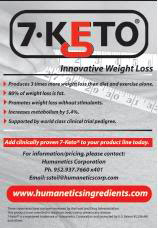For many individuals, weight management is a lifelong challenge. But, being in control of one’s weight is well worth the hard work it takes. Overweight individuals are at increased risk for a host of health problems including heart disease, high blood pressure, type-2 diabetes, gallstones, breathing problems and even cancer (1).
Given the expanding belt size of many Americans, it’s more imperative than ever before that the natural products industry offers consumers the best weight-management education and supplement selection it can. These tools along with regular exercise and healthy eating can help most consumers meet their weight-management goals.
Says Michael T. Yatcilla, vice president of research and development at Natrol, Inc., Chatsworth, CA, “The more safe, effective solutions consumers have, the better they can address their healthcare and weight-management needs.”
Before delving into some core weight-management products, let’s address two hot-button topics: weight-loss structure/function claims and the childhood overweight/obesity epidemic.
GSK’s Weight-Loss Petition
One recent debate in the category was sparked in April 2008 when pharmaceutical giant GlaxoSmithKline (GSK) partnered with the American Dietetic Association, The Obesity Society and Shaping America’s Health to submit a citizens’ petition to the U.S. Food and Drug Administration (FDA). Their hope was to convince the FDA to ban structure/function claims on weight-loss supplements and all related educational materials.
GSK claimed that “weight loss” is a disease claim (not a legitimate structure/function claim) because being overweight is linked with type II diabetes, heart disease and other illnesses. This argument discounts the possibility that some want to lose weight for physical appearance. Says John Alkire, president of AHD International, Atlanta, GA, “Deeming weight loss as a disease claim has no real validity, as people simply gain or lose weight depending on the amount and kinds of food they eat, paired with the amount of exercise they perform. There are too many variables in this category to make such a direct and definitive claim.”
It would be a precarious move for FDA to consider weight loss a disease claim. “Even in the case of new medical research, the industry would not be able to convey any message with a structure function claim to consumers, regardless of a natural product’s safety or efficacy,” says Keri Marshall, M.S., N.D., medical director of Gaia Herbs, Brevard, NC. She adds, “The only exception to this is if the health claim is so significant, such as in the case of calcium and osteoporosis, that the FDA may be petitioned to make such a claim.”
In agreement is Scott Steil, president of Nutra Bridge, Shoreview, MN: “There are dietary supplement ingredients that clearly help consumers lose weight and removing them from the marketplace would go against promoting the health of the U.S. consumer and addressing the epidemic we face as a country.”
The unfortunate end result could be that those who want to lose weight wouldn’t be able to get their hands on products to help them. And, Tom Walters, technical director for Bio-Form Essentials, Point Pleasant, NJ, believes that if the FDA declares weight loss as a disease claim, it may “reduce the sense of responsibility that individuals feel about their choices and promote the perception that only pharmaceutical drugs can offer any safe solution to weight management.”
What's Selling: Weight ManagementStore: Moonflower Market, Moab, UT Store: Country Vitamins, Corvallis, OR Store: Chamberlin's Market & Cafe, Winter Park, FL Store: Wayne & Mary's Nutrition Center, Mitchell, SD Store: Terry Naturally, Green Bay, WI |
The story wouldn’t be complete without noting that GSK is the maker of the over-the-counter weight-loss drug, alli. Around the time the petition was issued, sales data for alli were far less than the company had anticipated. Therefore, many feel the petition is less about protecting the interests of consumers and more about dominating a product category. “GSK is looking to create a bigger market for alli. The petition is a blatant attempt to steal the weight management marketplace away from the very people and companies like Nutratech that built the marketplace,” says Bob Green, President of Nutratech, Inc., West Caldwell, NJ.
Since the petition was made, many in our industry and others submitted comments to FDA making known their opposition to such a prohibition. But, several weight-management supplement makers feel the issue is far from dead and industry should remain vigilant about the situation. “It certainly wouldn’t be the end of days, however the effect would definitely be felt throughout the industry. Anyone who doubts this need only look back to 2004 when the FDA drew the curtains on ephedrine alkaloids. Companies who specialized exclusively in ephedra-based weight loss supplements didn’t have a fighting chance,” says Jayson Kroner, CSN, health and fitness editor for NOW Foods, Bloomingdale, IL. “If GSK has its way, history is bound to repeat itself.”
In addition to submitting comments to FDA, industry (including retailers) can combat the opposition in the form of positioning. “If we in the natural products industry can start to be clearer that our products only promote and support the natural abilities of the human cells, and therefore organs, and therefore finally the whole body, then we don’t need to worry. When we don’t claim our products treat or mitigate disease, then we are not only telling the truth, but we are also being compliant with the Structure/Functions Claims guide,” says Grace Ormstein, M.D., CTN, Ph.D., medical director and scientific herbal advisor, Himalaya Herbal Healthcare, Houston, TX.
 And, industry companies should continue to collect data to support any weight-loss claims. Green hopes this will have a positive outcome: encouraging ingredient suppliers and supplement manufacturers to act responsibly, abide by high-quality controls and partake in scientific research.
And, industry companies should continue to collect data to support any weight-loss claims. Green hopes this will have a positive outcome: encouraging ingredient suppliers and supplement manufacturers to act responsibly, abide by high-quality controls and partake in scientific research.
All in all, though, industry insiders note that the petition should not cause us to panic. After all, weight-management (and all) supplements are protected under the Dietary Supplements Heath Education Act (DSHEA). “The public’s interest in and right to information to natural drug alternatives was affirmed by Congress when it passed the DSHEA in 1994,” says Dawn Thorpe Jarvis, R.D., LDN, at Garden of Life, West Palm Beach, FL. “A guiding purpose for DSHEA was to carve out an area of commerce where manufacturers of dietary supplements could communicate their product benefits to the public. DSHEA specifically addressed weight loss claims, allowing them to be made and providing a template for their communication.”
Kids Deserve a Jump Start On Weight Management
According to www.kidshealth.org, one in three children are considered obese or overweight. Some of your youngest customers may fall into this category. Experts interviewed for this article say retailers should take special care when addressing the issue of children and weight loss (especially supplements). Says Green, “We always recommend that users of dietary supplements consult with their healthcare providers before embarking on a  weight-loss program. For children, this is essential. Children are still growing. If they use weight-management products, it should be under the supervision of their parents and healthcare providers.”
weight-loss program. For children, this is essential. Children are still growing. If they use weight-management products, it should be under the supervision of their parents and healthcare providers.”
Ormstein agrees, but notes that teens may benefit from such supplements (once a healthcare provider gives the green light). “I’m not a big believer in giving weight management supplements to younger children. For teens, yes, but not for young kids. It’s another way of saying to young children ‘you have to be dependent on something in order to have normal body weight’ and that sends them the completely wrong message,” she says.
What can a retailer do for this age group? First, focus on teaching healthy lifestyle choices and consider creating a section of healthy kid and teen-friendly foods. Offer information about healthy eating only when hungry, not eating while watching television and limiting high-calorie foods. Many children are over-exposed to the latter. “Foods marketed to kids are often sweets, snacks, and meals high in calories with little nutritional value. As a dietitian, I consider children’s foods to be those that promote growth and are nutrient-dense, like fresh fruits, vegetables and whole grains, but over-exposure to advertising that promotes high-calorie foods can certainly influence kids’ choices,” says Marci Clow, M.S., R.D., senior director of product research at Rainbow Light Nutritional Systems, Santa Cruz, CA.
 When selecting foods to include in a kid-friendly section, retailers can play a role in teaching children to eat “real” foods, says Thorpe Jarvis. “School gardens growing vegetables have become a popular way to teach children about healthy eating. Health food stores could similarly hold classes teaching children how to grow their own foods,“ she suggests and adds that retailers could sponsor a healthy eating seminar for children.
When selecting foods to include in a kid-friendly section, retailers can play a role in teaching children to eat “real” foods, says Thorpe Jarvis. “School gardens growing vegetables have become a popular way to teach children about healthy eating. Health food stores could similarly hold classes teaching children how to grow their own foods,“ she suggests and adds that retailers could sponsor a healthy eating seminar for children.
Marshall makes the excellent point that natural food manufacturers can help even more with marketing appropriate lunch or vending machine snacks to kids. “With the broad sweeping changes that are going on across the country in the school lunch programs, this is a wide open arena. Schools want to put healthy snacks in their vending machines, they just don’t know what they are or where to get them. The industry is not making it easy enough.”
But overall, keep in mind that education about the causes of being over weight is key. Says Vladimir Badmaev, M.D., Ph.D., vice president of medical and scientific affairs at Sabinsa Corporation, Piscataway, NJ, “There is no pill solution that will save our children from obesity, unless each parent translates the TLC into good nutritional advice and practice for their children. Only with nutritional and behavioral modification in place can a carefully selected dietary supplements be of some help to curb appetite by, for example, providing nutrient-rich, not calories-rich, snacks.”
Badmaev notes that superfruits may be of use in this area. For example, amla (Indian gooseberry) is “an important dietary source of amino acids, phenolic compounds, and dietary tannins,” he says. Its sweet, fruity taste may be suitable for healthy snacks and drinks.
 On the supplement side, industry manufacturers recommend a few options for teens who have their parents’ and physician’s approvals to start such a regimen. First, all children and teens can benefit from a multivitamin to fill in their diets’ nutritional gaps. For picky youngsters, companies like Rainbow Light and Nutrition Now offer multivitamins in tasty chewable and gummy forms.
On the supplement side, industry manufacturers recommend a few options for teens who have their parents’ and physician’s approvals to start such a regimen. First, all children and teens can benefit from a multivitamin to fill in their diets’ nutritional gaps. For picky youngsters, companies like Rainbow Light and Nutrition Now offer multivitamins in tasty chewable and gummy forms.
Safe, non-stimulating herbs, says Ormstein, may help teens looking to take control of their weight. Options include Gymnema, which helps curb a sweet tooth, and Garcinia, for maintaining a health body weight.
According to Michael T. Murray, N.D., director of product development and education at Natural Factors Nutritional Products, Inc., Everett, WA University of Toronto research on the company’s branded meal replacement formula with fiber (SlimStyles weight-loss drink mix) found it is “an ideal strategy to help children and adolescents achieve their weight management goals. In the study, the subjects receiving the meal replacement mix that contained the revolutionary new fiber matrix PGX consumed fewer calories than the control group.”
Other branded fiber supplements may be suitable for teens, too, according to their makers. For example, Alkire of AHD International notes that the company’s glucomannan fiber ingredient (LuraLean) has been “proven safe and effective for all age groups, including children and teens.”
And according to information provided by Bio-Form Essentials, the company’s natural fiber (alpha-Fibe) “offers an excellent option for healthy weight management across a wide range of people, including young people.” The ins and outs of fiber supplementation will be discussed later in this article.
This section names only a handful of options for teenagers. Check with your manufacturers for more on what’s safe for this age group.
 Must-Haves for Your Weight Management Section
Must-Haves for Your Weight Management Section
Unless you can afford to stock everything in the weight-management category, says Kroner, “it can be difficult to determine which weight loss supplements to stock. If you’ve turned on a television in the past five years, chances are, you’ve likely seen at least one commercial for any of the hundreds of weight-loss supplements available today... [This means retailers] need to pay attention to the trends, while preparing the staff on how to offer a better solution.”
Everyone’s weight-management goals are different, but there are a few core items that industry experts suggest you stock up on for your clients. Overall, advises Yatcilla, “A retailer should offer a fat burner, a carb blocker, a metabolism and energy booster, a cleansing product and an appetite suppressant to help with weight management.“
Fiber. First, in addition to a good multivitamin that’s superfood-rich and has a strong B-complex (for energy), fiber is a good choice for those looking to lose weight. Fiber-rich meals take longer for the body to process and their bulk creates a feeling of satiety with fewer calories. In addition, high-fiber foods tend to force us to slow down while eating because they require extra chewing (2). These two factors combined may help control energy balance and body weight, according to the International Food Information Council (IFIC) Foundation. “The strongest evidence to support fiber’s role in weight management comes from studies that found an association between a fiber-rich diet and lower body mass index (BMI)…Additional research is needed to determine the amounts and types of fiber required to produce the greatest effects on managing body weight,” says IFIC (2).
This supplement isn’t limited to weight-control benefits, though. Says Clow, “Fiber is one of the most researched elements of the human diet shown to provide numerous health benefits, especially for reducing the risk of cancer, heart disease, obesity and digestive problems. Yet people in developed countries eat much less fiber than our ancestors did—by a margin of at least 10:1!”
Clow also raises the point that different fibers work in different ways. “Soluble and insoluble fibers have slightly different physiological effects: both are effective in satiating the appetite and reducing bacterial toxins in the digestive  system. Insoluble fiber plays the major role in eliminating and absorbing toxins. Soluble fiber does have an impact on those functions, but is more responsible for stabilizing blood sugar and reducing serum cholesterol. Any fiber supplementation program should include sufficient intake of water to optimize fiber health benefits,” says Clow.
system. Insoluble fiber plays the major role in eliminating and absorbing toxins. Soluble fiber does have an impact on those functions, but is more responsible for stabilizing blood sugar and reducing serum cholesterol. Any fiber supplementation program should include sufficient intake of water to optimize fiber health benefits,” says Clow.
On the point of the uniqueness of specific fibers, Walters notes the benefits of a branded soluble fiber (alpha-dextrin) from Bio-Form Essentials. This supplement is said to bind to fats in the stomach before it is absorbed into the bloodstream, without the unwanted side-effects weight-loss drugs often create. Said to remove about 500 dietary calories per day, the supplement promoted gradual weight loss during clinical studies of about 1.5 pounds per week without major lifestyle changes.
“Alpha-Fibe acts as the smartest fiber we know of and also performs the valuable function of raising the proportion of ‘good’ fats to ‘bad’ fats in the bloodstream when used as directed. We believe that people need to use sufficient amounts of these nutrients before trying out new, exotic nutrients,” says Walters. The supplement is also suitable for several other applications including supporting and promoting healthy cholesterol levels, blood pressure, glycemic control and digestion/elimination.
 Another branded soluble fiber supplement that may be a good choice for clients combines glucomannan (from konjac root), alginate (from seaweed) and xanthum gum (produced by bacteria). According to Murray of Natural Factors, his company’s PolyGlycoPlex (PGX) supplement is the result of research led by the discoverers of the glycemic index. “This world-recognized research team tested hundreds of different fiber combinations in laboratory, animal and human studies before the basic composition of this super-fiber was discovered,” says Murray. “Dr. Michael Lyon then led a team of scientists in two years of exhaustive research to create the processes and formulas which led to significant improvements in the practical applications of PGX.”
Another branded soluble fiber supplement that may be a good choice for clients combines glucomannan (from konjac root), alginate (from seaweed) and xanthum gum (produced by bacteria). According to Murray of Natural Factors, his company’s PolyGlycoPlex (PGX) supplement is the result of research led by the discoverers of the glycemic index. “This world-recognized research team tested hundreds of different fiber combinations in laboratory, animal and human studies before the basic composition of this super-fiber was discovered,” says Murray. “Dr. Michael Lyon then led a team of scientists in two years of exhaustive research to create the processes and formulas which led to significant improvements in the practical applications of PGX.”
Clinical studies indicate that this branded fiber complex helps reduce appetite and promote weight loss; reduce the glycemic index of a meal by 35–70%, lower the level of compounds that fuel overeating, decrease blood insulin levels, stabilize blood sugar levels and lower cholesterol and triglyceride levels.
High-fiber chia also is said to increase satiety. Says Bill Chioffi, Eastern regional sales manager for Gaia Herbs, “When taken before meals it helps with weight management by making you ‘feel fuller faster,’ thus decreasing appetite. Derived from the nutrient-rich chia seed, it also offers a balanced source of omega-3 and omega-6 EFAs for a more complete health benefit.”
Herbs. Also on the herbal front, Ormstein offers five suggestions. Garcinia (Garcinia cambogia) contains phytochemicals like hydroxycitric acid and antioxidants. “It supports normal appetite level, the normal conversion of carbohydrates to fat, and it also supports the normal production of serotonin,” she says.
In addition, guggul (Commiphora mukul) supports normal fat levels and metabolism as well as normal cholesterol levels. Gymnema (Gymnema sylvestre), which means “sugar destroyer,” helps curb sugar cravings and normal pancreatic cell integrity. Ginger (Zingiber officinalis) aids digestion, acts as a thermogenic, improves circulation and helps with fat metabolism.
Research also indicates that soy consumption helps individuals to lose weight. According to research from the University of Illinois, soy protein hydrolysates may have an effect on leptin (a hormone that signals fullness). “We found that soy did have an effect on these mechanisms and hormones that are induced in the body to help us degrade lipids and reduce body weight, but it did so by boosting metabolism and not by reducing food intake,” stated Elvira de Mejia, assistant professor of food science and human nutrition (3).
Certain herbs may also help enhance energy. “One of the most popular formulae in Ayurveda for general support of the exhausted organism is Chayvenprash, of which the main component is fruit of Emblica officinalis vern,” says Badmaev and notes that amla and triphala may also help combat “indigestion and metabolic imbalance.” In addition, the hydroxycitric acid extracted from Garcinia gambogia fruit rind helps “improve the energy levels probably due to increase in the muscle glycogen levels—a storage form of the ‘instant energy’ molecule, glucose.” This extract is also said to promote satiety
Last, according to information from Nutraceuticals International, Elmwood Park, NJ, Cha’ de bugre is an appetite suppressant that helps reduce fat deposits.
Thermogenics. Nearly all industry experts note that thermogenics are important elements in your weight management category. This bracket refers to agents that produce heat in the body and “increase resting metabolic rate and the rate at which fat is released from body stores and broken down (lipolysis) to help burn fat and calories,” says Green, who adds, “Thermogenesis is the only scientifically proven method of weight-loss and toning.” Under this umbrella falls several supplements such as DHEA, green tea extract, bitter orange extract, fucoxanthin and others.
DHEA (such as the branded 7-Keto from Humanetics) “allows the body to burn fat more efficiently (specifically, 7-Keto increases the activity of key fat burning enzymes),” says Steil. This substance, he notes, is found in the body, but levels decline with age. “Typically, a person loses about 50% of their endogenous 7-Keto levels by age 40,” he explains. “This results in our bodies’ inability to burn fat like it used to when we were younger.” According to Steil, clinical data suggest that this ingredient performs three times better than placebos in weight management studies and helps users increase their metabolism by 5.4% over the placebo. Researchers also found that individuals lose an extra five pounds when using the supplement than with diet and exercise alone. About 80% of weight loss in these studies was pure body fat, says Steil.
|
Weighing Your Supplement Options The weight-management supplement category has much to offer. Here is a selection of such items, broken down by their primary mechanism of action. Natural Energy Enhancers Garden of Life offers Clear Energy, Tea Trio and Vitamin Code B-Complex (coming soon). Natrol is the maker of Guarana and Green Tea supplements. The company’s Slim Mix helps provide hunger control and an energy boost. Carb Burners/Blockers Natrol’s Carb Intercept (with Phase 2) neutralizes carbohydrate calories. Gaia Herbs offers Glycemic Health, which helps to normalize sugar cravings. Phase 2 from NOW Foods is an all-natural bean extract that helps reduce the breakdown and carb absorption by limiting the action of alpha-amylase enzymes. Sabinsa also offers Fabenol (from white beans). Satiety/Appetite Suppressors From AHD International is the LuraLean ingredient, which is said to promote satiety and carry fats out through normal digestion. Garden of Life makes Perfect Meal and fücoPROTEIN bars. PGX Daily from Natural Factors is a super fiber matrix that is complexed with medium-chain triglycerides (MCTs) from coconut oil. MCTs help burn fat while the fiber promotes satiety. PGX Daily also supports healthy blood sugar levels and improve cholesterol. Natrol’s Slenderite offers triple-action appetite control, metabolism booster and carb control. Chia Fresh Daily Fiber from Gaia Herbs is high-fiber supplement derived from the chia seed. NOW Foods offers Slimaluma, which works by mimicking a sensory that the stomach is full. Also available is Tru Hoodia Complex and Mega Hoodia. Citrin and Garcitrin from Sabinsa promotes satiety. Fat Oxidizers/Thermogenics Garden of Life makes FucoTHIN and fücoPROTEIN bars. Humanetics supplies 7-Keto for fat oxidation and increased metabolism. Natrol makes L-Carnitine 500 mg, which helps promote fat metabolism. The company also offers Tonalin CLA, which is clinically proven to reduce body fat and prevent fat regain. Nutratech is the supplier of Advantra Z (derived from bitter orange), which stimulates thermogenesis and suppresses appetite. From Gaia Herbs are Green Tea Phyto Caps. Super Citrimax, Naturally from NOW Foods combines Citrimax, ChromeMate, Panax ginseng and kelp. This supplement supports the natural metabolism of lipids. Sabinsa supplies Forslean (Coleus forskohlii), which may help increase lean body mass. Fat Blockers AHD International’s LuraLean contains 97 grams of pure fiber, which passes through the system and carries out excess calories and fats. Bio-Form Essentials USA manufactures Alpha-Fibe, which blocks fat absorption by going after saturated and trans fats first. It also provides a sense of fullness. Multi-Functional LeanCare from Himalaya Herbal Healthcare USA combines garcinia, guggul, gymnema and ginger as well as triphala (for normal digestion) and bitter melon (for normal blood sugar levels). From Rainbow Light Nutritional Systems is Thinberry Diet, which contains Svetol (decaffeinated green coffee berry extract), green tea extract and artichoke leaf. This supplement is said to help regulate blood sugar, flush the system, offer thermogenic effects, inhibit fat absorption and activate fat metabolism in the liver. The company also offers Daily Fruit & Fiber (for cleansing and regularity) and Protein Energizer. Laci Le Beau from Natrol is an herbal dieter’s tea that helps with elimination and regularity, which is important for many people when they start a weight management program to give them that initial boost and periodically for cleansing their bodies. Bluebonnet Nutrition Corp. offers Trimology, Super Chrometene (chromium and l-carnitine), Diet Chrome-Care and Tonalin CLA. |
Next, green tea is a top weight-management supplements. Says Clow, “Green tea is EVERYWHERE. It’s been classified as a ‘superfood’ for its use in reducing rates of heart disease and cancer. It has also been researched for its benefit in promoting weight loss through [various] mechanisms.”These data-supported mechanisms, she says, include the following:
• Positive effects on blood sugar.
• Increasing metabolic rate.
•Lowering bad cholesterol and triglyceride levels thanks to its beneficial catechins like EGCG.
• Increasing postprandial thermogenesis and fat oxidation.
• Inhibiting enzymes that process carbohydrates and fats.
Bitter orange extract is said to contain synephrine, “which affects body weight and fat mass and also breaks down fat” (4). According to Green, a thorough six-year study on a branded form of bitter orange (AdvantraZ from Nutratech) was conducted by McGill University’s Nutrition and Food Science Centre in Montreal. The investigation yielded the following results:
• In some study participants, the ingredient increased energy expenditure by as much as 29%. And, it increased resting metabolic rate in obese subjects.
• Lean subjects who consumed the ingredient had an increased thermogenic response after eating. It should be noted that the branded extract is different from the generic version in that it contains only p-synephrine, whereas the latter has synephrine as the dominant amine, says Green.
Fucoxanthin, a carotenoid derived from brown seaweed, is another hot weight-management supplement in the thermogenic realm. According to information from Garden of Life (maker of fücoTHIN), fucoxanthin boosts metabolism and breaks down fat without affecting the nervous system. The company also explains that fucoxanthin targets a protein that burns abdominal fat.
Others. Retailers should also consider adding these supplements to their weight-management section:
• Green coffee berry is a rising star in the category with “impressive research to support its benefits for weight loss,” says Clow. “Scientific research has shown that chlorogenic acids, particularly 5-caffeoylquinic acid from green coffee berry, reduce intestinal absorption of glucose and inhibit glucose-6-phosphatase, ultimately causing a decrease in blood glucose that results in the breakdown of adipose (fat) tissue.”
• Omega-3s can’t be left off the list of supplements for those interested in weight management. As previously stated, carrying excess body weight may increase one’s risk for heart problems. Omega-3s are said to reduce heart pressure, improve cholesterol, lessen inflammation and keep arteries flexible. Says Chioffi, “Fish and fish oils in the diet provide excellent forms of omega-3 oils as well as vitamin A, which act to improve T3 receptor binding and thyroid hormone activity. Chia seed oil is also an excellent source of balanced omega-3s and a healthy vegetarian alternative to fish oil as a source of omega-3s.”
• L-carnitine can help to “promote a healthier body weight and favor muscle (lean tissue) deposition,” according to Lonza (supplier of Carnipure, l-carnitine). The “energy nutrient” helps transport fatty acids into the mitochondria, where it converts fat into energy.
• Conjugated linoleic acid (CLA) is said to be helpful for increasing lean muscle mass and avoiding weight regain. According to Cognis (supplier of Tonalin CLA), clinical trial data showed that overweight individuals who used the supplement without changing their diet or exercise regime lost 9% of their body fat and had a 2% increase in lean body mass compared with those who received the placebo. Of note, healthy subjects who took the supplement and exercised (90 minutes, three times per week) had a 20% reduction in body fat.
• Chromium helps improve sugar metabolism. According to InterHealth Nutraceuticals (supplier of ChromeMate niacin-bound chromium), “Chromium helps insulin metabolize fat, turns protein into muscle and converts sugar into energy. In fact, chromium-activated insulin increases the amount of blood sugar available for energy production nearly twenty-fold.”
• Magnesium and B-complex vitamins, says nutrition expert Carolyn Dean, M.D., N.D., are “energy nutrients” that “activate enzymes that control digestion, absorption and the utilization of proteins, fats and carbohydrates.”  Deficiencies in these nutrients, she says, can lead to health problems such as obesity. In fact, she notes that gaining abdominal fat may be “related to magnesium deficiency and an inability to utilize insulin”(5).
Deficiencies in these nutrients, she says, can lead to health problems such as obesity. In fact, she notes that gaining abdominal fat may be “related to magnesium deficiency and an inability to utilize insulin”(5).
• Licorice flavonoid oil (LFO) is another important member of the weight-management category. According to Beeta Little, PMP, director of product development and technical services at Bluebonnet Nutrition Corporation, a proprietary LFO (Glavonoid from Kaneka) has been shown in animal and human studies “to help maintain healthy body fat composition by optimizing fat metabolism (increase fatty acid breakdown and decrease fatty acid synthesis) via gene expression. LFO is void of glycyrhizinic and glycyrhetinic acids that are known in traditional licorice root extracts to increase blood pressure and potassium loss and retain sodium,” she explains. “Suppressing the manufacturing of fat (lipogenesis) while enhancing the cell’s ability to breakdown fat (fat oxidation) is an exciting and worthy area of pursuit.” Such action may help improve the “clinical features of metabolic syndrome,” she says.
• Badmaev notes a new category is emerging from research on restricted calories diets, “which may activate longevity genes, sirtuins.” He explains that compounds like resveratrol (from grapes or roots of Polygonum cuspidatum) and stilbenes (from Pterocarpus marsupium) “may mimic effects of low-calorie diets and produce many of the positive metabolic adjustments including a gradual decrease in metabolic, hormonal, and inflammatory risk factors for diabetes, cardiovascular disease and cancer. WF
References
- 1.National Heart, Lung and Blood Institute, “What Are Obesity and Overweight?” www.nhlbi.nih.gov, accessed January 25, 2009.
- 2. International Food Information Council Foundation, “Fiber Fact Sheet,” November 2008.
- 3. University of Illinois at Urbana-Champaign, “How Does Soy Promote Weight Loss?” May 6, 2007, www.sciencedaily.com–/releases/2007/05/
- 070501115010.htm, accessed January 27, 2009.
- 4. M. Tallon, “A Weight-Control Efficacy Pyramid,” Functional Foods & Nutr. March 2007.
- 5. C. Dean, The Magnesium Miracle (Balantine Books, New York, NY, 2007).
Published in WholeFoods Magazine, March 2009










